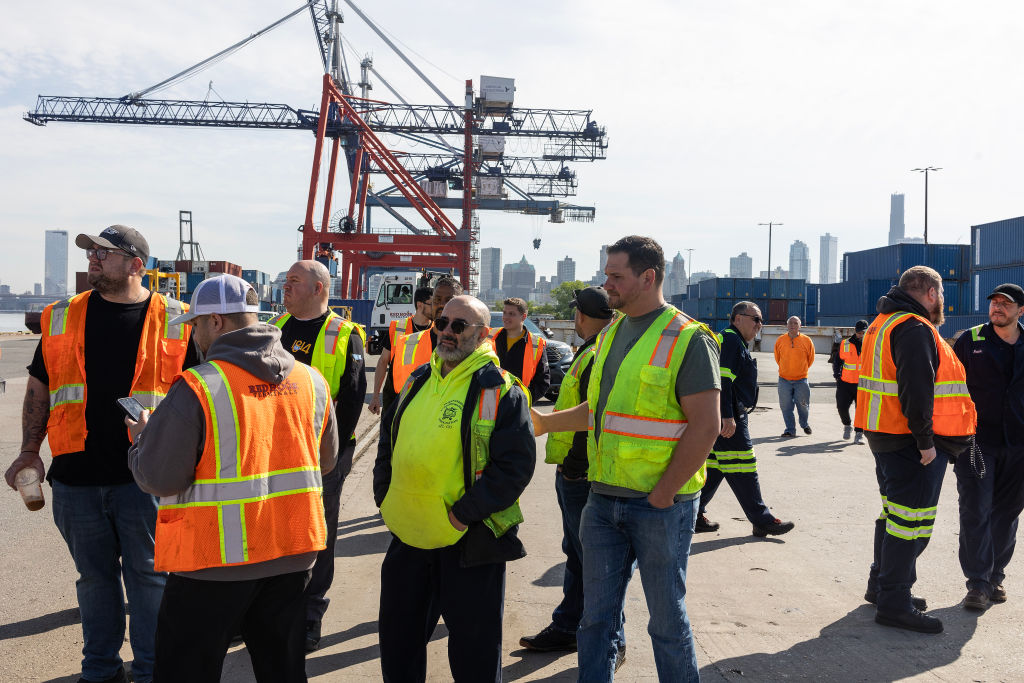Thousands of workers could strike early Tuesday from three dozen ports, crashing the supply chain and costing the US economy billions of dollars a day. That’s bad news for everyday Americans, none of whom have likely forgotten egg shortages or the toilet paper terrors that came after the whole world shut down for COVID. But as bad as it is for Americans, it may be worse for Kamala Harris. No, she probably won’t have to worry about running out of household goods like the rest of the country – but she certainly could be staring down the end of her political career.
A High Stakes Strike
Somewhere in the region of 45,000 longshoremen employed across 36 ports on the US Atlantic and Gulf Coasts could walk off the job come Tuesday, October 1. This high-stakes strike would shut down about half of US ocean imports and, according to analysis from JPMorgan, could cost the US economy about $5 billion each day. It could also drive up shipping costs, which would then likely be passed on to consumers. If the issue isn’t resolved quickly, look forward to increased wait times as products sit in containers with nobody to unload them and higher costs because of it.
The International Longshoremen’s Association (ILA), the union that represents port workers from Maine to Texas, has threatened to strike as soon as the current six-year contract is up at midnight on Monday, September 30. The issue at hand – as is often the case – is pay. The union and the US Maritime Alliance employer group have been negotiating the next contract since early summer, but the two groups are at an impasse on dock worker pay. The ILA demands an increase, and those demands aren’t being met.
According to the American Farm Bureau Federation, about 53% of all US waterborne agricultural imports would be at risk – a potential value of about $1.1 billion in a week. Three-quarters of the nation’s banana imports and large quantities of coffee and cocoa could also be lost. The Soy Transportation Coalition suggests the strike might also affect container exports of soy products and would seriously impact frozen meat and eggs. The $18-billion-a-year beef and pork and the $5.8 -billion-a-year poultry and egg exports from the US rely on refrigerated containers. The longer they sit idle, the more likely all of that food goes to waste. The strike could also slow the flow of pharmaceutical products in and out of the US, according to Everstream Analytics, affecting an estimated 91% of imports and 69% of exports.
So, yes, toilet paper and eggs may yet again soon disappear from the shelves – but the big picture hit to both the individual consumer and the overall economy would hardly be so limited in scope.
The Political Costs
As disastrous as such a thing could be, the effects would eventually fade. A few years down the road, it’ll all be yet another unpleasant memory for most Americans. For Kamala Harris, however, the effects could be a bit more permanent.
If the strike happens, it’ll start on Tuesday, October 1 – the very day of the vice-presidential debate between JD Vance and Tim Walz, and there’s little over a month left until Election Day.
If the Biden administration does nothing and allows the strike to go ahead, it likely won’t bode well for the Democratic Party’s presidential candidate – the sitting vice president. Voters will go to the polls with fresh fears of critical shortages and anger over increased prices and the general inconvenience of it all. Who will they blame? Well, Donald Trump doesn’t have a hand in this mess – but Kamala Harris does. One might recall that Trump seemed well on his way to re-election before the COVID-19 pandemic and the deaths, shutdowns, and economic turmoil that followed. True, nobody is likely to die because of this strike – but effectively halting half of America’s trade with outside nations makes one nasty economic October surprise for the woman who is, for all practical effect in this particular situation, the incumbent running for re-election.
On the other hand, the Biden administration does have the authority, thanks to the Taft-Hartley Act of 1947, to force the strikers to return to work. But Democrats are supposed to be the “pro-union” people – and Joe Biden touts his administration as the most pro-union ever. The loss of votes sure to follow the administration breaking a strike by union members would likely reverberate down the ballot, costing far more Democrats than just Kamala Harris their jobs.
It’s a damned if they do and damned if they don’t kind of situation, and there doesn’t seem to be a safe course of action available. Unless an agreement is reached quickly between employees and employers, Harris may pay the price.




